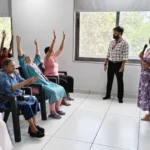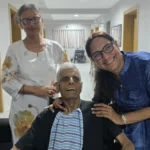Ageing is a natural part of life, bringing with it a range of physical and mental changes. One significant area of concern for seniors is the health of their neurological system. Neuro care in elders is crucial for maintaining quality of life and managing the unique challenges that arise with age. In this comprehensive guide, we’ll explore the essentials of neuro care, the role of a neurology care center, how to develop an effective neuro care plan, and the most common neurological disorders in old age, along with available neurological treatments.
Understanding Neuro Care in Elders
Neuro care involves the prevention, diagnosis, and treatment of neurological disorders, which affect the brain, spinal cord, and nerves. For elders, neuro care is particularly important as the risk of neurological disorders increases with age. These conditions can significantly impact an individual’s ability to function independently, making early intervention and ongoing management vital.
The Importance of a Neurology Care Center
A neurology care center specialises in the treatment of neurological conditions. These centers are staffed with experts in neurology who have extensive experience dealing with age-related neurological disorders. They offer a range of services, including diagnostic tests, individualised treatment plans, and ongoing care management.
Choosing the right neurology care center is a critical step in ensuring that elders receive the best possible care. These centers provide access to state-of-the-art diagnostic tools and treatments, ensuring that each patient receives personalised and effective care. Additionally, they offer a supportive environment where patients and their families can find guidance and support.
Common Neurological Disorders in Old Age
As we age, the likelihood of developing neurological disorders increases. Here are some of the most common neurological conditions affecting elders:
Alzheimer’s Disease and Other Dementias
Alzheimer’s disease is the most common cause of dementia, characterised by progressive memory loss and cognitive decline. Vascular dementia, Lewy body dementia, and frontotemporal dementia are among other types of dementia. Early diagnosis and action are critical for properly managing these disorders.
Parkinson’s Disease
Parkinson’s disease is a degenerative neurological illness that hinders movement. Symptoms include tremors, stiffness, and balance problems. Although there isn’t a cure, there are ways to control the symptoms and improve life.
Stroke
A stroke happens when the blood flow to a portion of the brain is cut off or decreased, preventing brain tissue from receiving oxygen and nutrients. Prompt medical attention is crucial in minimising brain damage and enhancing recovery.
Peripheral Neuropathy
Peripheral neuropathy involves damage to the peripheral nerves, often resulting in weakness, numbness, and pain, typically in the hands and feet. Many things can contribute to it, such as diabetes, infections, and specific drugs.
Multiple Sclerosis (MS)
MS is an autoimmune disorder where the immune system attacks the protective sheath (myelin) that covers nerve fibers, causing communication problems between the brain and the rest of the body. Symptoms vary widely and can include fatigue, difficulty walking, and cognitive changes.
Developing an Effective Neuro Care Plan
Creating a comprehensive neuro care plan is essential for managing neurological disorders in elders. Here are the key components of an effective neuro care plan:
Accurate Diagnosis
The first step in any neuro care plan is an accurate diagnosis. This often involves a combination of medical history, physical examination, neurological tests, and imaging studies such as MRI or CT scans. Early and precise diagnosis can significantly impact the effectiveness of treatment.
Personalised Treatment Plan
Once a diagnosis is made, a personalised treatment plan should be developed. This plan should take into account the specific condition, the severity of symptoms, and the patient’s overall health and preferences. Medication, physical therapy, occupational therapy, and, in certain situations, surgery, are potential types of treatment.
Medication Management
Many neurological disorders require long-term medication management. It is essential to review medications regularly to ensure they are effective and adjust dosages as needed. Additionally, monitoring for side effects and interactions with other medications is crucial.
Rehabilitation and Therapy
Rehabilitation services such as physical, occupational, and speech therapy play a critical role in neuro care. These therapies help patients regain function, improve mobility, and enhance their ability to perform daily activities.
Lifestyle Modifications
Encouraging a healthy lifestyle can have a significant impact on managing neurological disorders. This includes a balanced diet, regular exercise, mental stimulation, and adequate sleep. Lifestyle modifications can help slow the progression of certain conditions and improve overall well-being.
Support Systems
Support from family, friends, and support groups is invaluable for individuals with neurological disorders. Emotional support, practical assistance, and social engagement can greatly enhance the quality of life for elders.
Neurological Treatment Options
Advancements in medical science have led to a variety of treatments for neurological disorders. Here are some of the most common neurological treatments available:
Medications
When treating neurological problems, medications are frequently the initial line of treatment. These can include drugs to manage symptoms, such as pain relievers, anti-seizure medications, and drugs that improve cognitive function.
Surgery
In some circumstances, surgery may be required to treat neurological problems. This can include procedures to remove tumours, relieve pressure on the brain, or correct structural abnormalities.
Therapeutic Interventions
Therapeutic interventions such as physical, occupational, and speech therapy are essential components of a comprehensive neuro care plan. These therapies can help patients regain lost functions and improve their ability to perform everyday tasks.
Alternative Treatments
Some patients may benefit from alternative treatments such as acupuncture, chiropractic care, and herbal supplements. While these should not replace conventional medical treatments, they can be used as complementary therapies under the guidance of a healthcare provider.
Conclusion
Neuro care for elders is crucial and multifaceted, requiring a comprehensive approach. By understanding common neurological disorders in old age, choosing the right neurology care center, and developing a personalised neuro care plan, we can significantly enhance the quality of life for our elderly loved ones. With proper care and support, elders can effectively navigate neurological challenges and continue to lead fulfilling lives.
















